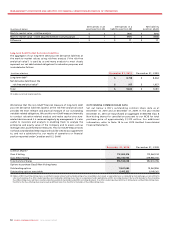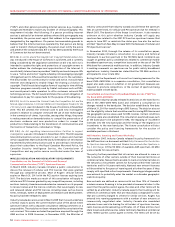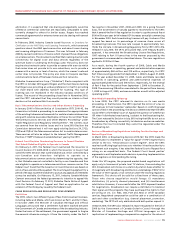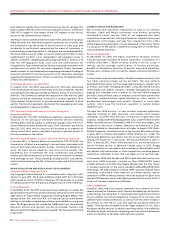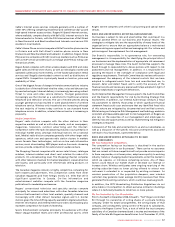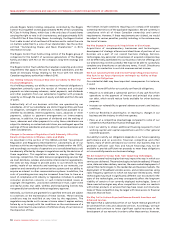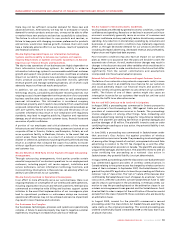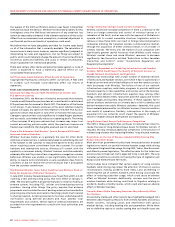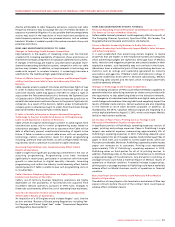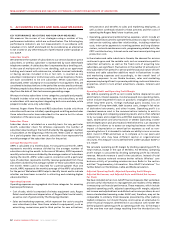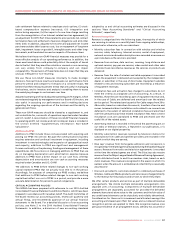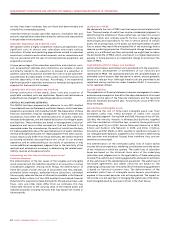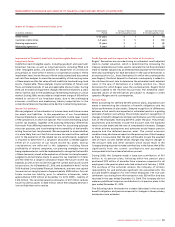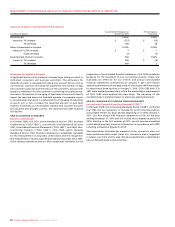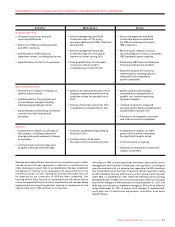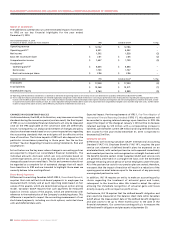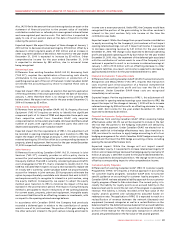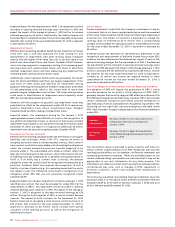Rogers 2010 Annual Report Download - page 56
Download and view the complete annual report
Please find page 56 of the 2010 Rogers annual report below. You can navigate through the pages in the report by either clicking on the pages listed below, or by using the keyword search tool below to find specific information within the annual report.
MANAGEMENT’S DISCUSSION AND ANALYSIS OF FINANCIAL CONDITION AND RESULTS OF OPERATIONS
60 ROGERS COMMUNICATIONS INC. 2010 ANNUAL REPORT
Our appeal of the 2007 certification decision was heard in December
2010 and we await the decision. We have not recorded a liability for this
contingency since the likelihood and amount of any potential loss
cannot be reasonably estimated. If the ultimate resolution of this action
differs from our assessment and assumptions, a material adjustment to
our financial position and results of operations could result.
We believe that we have adequately provided for income taxes based
on all of the information that is currently available. The calculation of
income taxes in many cases, however, requires significant judgment in
interpreting tax rules and regulations. Our tax filings are subject to
audits, which could materially change the amount of current and future
income tax assets and liabilities, and could, in certain circumstances,
result in assessment of interest and penalties.
There exist certain other claims and potential claims against us, none of
which is expected to have a materially adverse effect on our
consolidated financial position.
Tariff Increases Could Adversely Affect Results of Operations.
Copyright tariff pressures continue to affect our services. If fees were
to increase, such increases could adversely affect our results of
operations.
RISKS AND UNCERTAINTIES SPECIFIC TO WIRELESS
Spectrum Fees May Increase With the Renewal of Cellular and
PCS Spectrum Licences.
In November 2010, the Minister of Industry announced that Industry
Canada would freeze the spectrum fees at current levels for cellular and
PCS spectrum due for renewal in March 2011. The duration of the freeze
is not known. It also remains unknown at this point whether Industry
Canada will apply any spectrum fees related to the 2001 PCS Auction
spectrum licences that expire in June 2011 or maintain the status quo.
Changes to spectrum fees could significantly increase Rogers’ payments
and as a result, could materially reduce our operating profit. The timing
of fee increases (if any) are unknown but increases may impact our
current accounting policies under which the spectrum licences are
treated as an indefinite life intangible asset and are not amortized.
There Is No Guarantee that Wireless’ Service Revenue Will Exceed
Increased Handset Subsidies.
Wireless’ business model, as is generally the case for other North
American wireless carriers, is substantially based on subsidizing the cost
of the handset to the customer to reduce the barrier to entry, while in
return requiring a term commitment from the customer. For certain
handsets and smartphone devices, Wireless will commit with the
supplier to a minimum subsidy. Wireless’ business could be materially
adversely affected if by virtue of law or regulation or negative customer
behaviour, Wireless was unable, or was significantly restricted in its
ability, to require term commitments or early cancellation fees from its
customers or did not receive the service revenues that it anticipated
from the customer commitment.
The National Wireless Tower Policy Could Increase Wireless’ Costs or
Delay the Expansion of Wireless’ Networks.
In June 2007, Industry Canada released a new Tower Policy (CPC-2-0-03)
outlining a new antenna siting policy that took effect on January 1,
2008. The new policy affects all parties that plan to install or modify an
antenna system, including PCS, cellular and broadcasting service
providers. Among other things, the policy requires that antenna
proponents must consider the use of existing antenna structures before
proposing new structures and owners of existing systems must respond
to sharing requests. Antenna proponents must also undertake public
notification using defined processes and must address local
requirements and concerns. Certain types of antenna installations are
excluded from the requirement to consult with local authorities and
the public.
Foreign Ownership Changes Could Increase Competition.
Wireless could face increased competition if there is a removal of the
limits on foreign ownership and control of wireless licences or a
relaxation of the limits, such as seen with the approval of Globalive to
operate with its current ownership structure. Legislative action to
remove or relax these limits can result in foreign telecommunication
companies entering the Canadian wireless communications market,
through the acquisition of either wireless licences or of a holder of
wireless licences. The entry into the market of such companies with
significantly greater capital resources than Wireless could reduce
Wireless’ market share and cause Wireless’ revenues to decrease
significantly. See the section entitled “Restrictions on Non-Canadian
Ownership and Control” under “Government Regulation and
Regulatory Developments”.
Wireless is Dependent on Certain Key Infrastructure and Handset
Vendors, Which Could Impact the Quality of Wireless’ Services or
Impede Network Development and Expansion.
Wireless has relationships with a small number of essential network
infrastructure and handset vendors, over which it has no operational or
financial control and only limited influence in how the vendors conduct
their businesses with Wireless. The failure of one of our network
infrastructure suppliers could delay programs to provide additional
network capacity or new capabilities and services across the business.
Handsets and network infrastructure suppliers may, among other
things, extend delivery times, raise prices and limit supply due to their
own shortages and business requirements. If these suppliers fail to
deliver products and services on a timely basis or fail to develop and
deliver handsets that satisfy Wireless’ customers’ demands, this could
have a material adverse effect on Wireless’ business, financial condition
and results of operations. Similarly, interruptions in the supply of
equipment for our networks could impact the quality of Wireless’
service or impede network development and expansion.
Long-Distance Equal Access Could Increase Competition.
The CRTC’s three-year Work Plan continues to indicate their intent to
review the issue of Long-Distance Equal Access for Wireless Carriers. If
required, this may introduce additional competition in the provision of
wireless long-distance thus impacting Wireless’ long-distance revenues.
Restrictions on the Use of Wireless Handsets While Driving May
Reduce Subscriber Usage.
Most provincial government bodies have introduced and/or enacted
legislation to restrict or prohibit wireless handset usage while driving
while permitting hands-free usage. During 2010, Yukon, New Brunswick
and Alberta passed legislation. The effective date for the latter two
provinces has not been set, but is expected to be in mid-2011. The only
Canadian jurisdictions currently not having this type of legislation are
Nunavut and the Northwest Territories.
Some studies have indicated that certain aspects of using wireless
handsets while driving may impair the attention of drivers in various
circumstances, making accidents more likely. Laws prohibiting or
restricting the use of wireless handsets while driving could have the
effect of reducing subscriber usage, which could cause an adverse
effect on Wireless’ business. Additionally, concerns over the use of
wireless handsets while driving could lead to litigation relating to
accidents, deaths or bodily injuries, which could also have an adverse
effect on Wireless’ business.
Concerns About Radio Frequency Emissions May Adversely Affect
Our Business.
Occasionally, media and other reports have highlighted alleged links
between radio frequency emissions from wireless handsets and various
health concerns, including cancer, and interference with various
medical devices, including hearing aids and pacemakers. While there
are no definitive reports or studies stating that such health issues are


